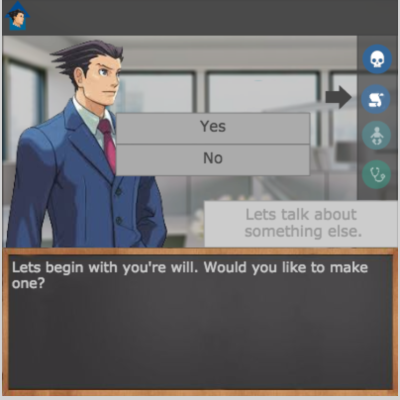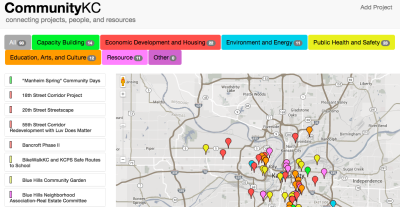June 6 was the National Day of Civic Hacking, a nationwide initiative that encourages anyone to build solutions for their communities. Developers, mayors, government staffers, students and civic-minded citizens gathered in spaces across the country to solve challenges they face every day.
With more than 100 NDOCH events officially registered on Code for America’s website, there were bound to be large- and small-scale successes.
Here, Technical.ly takes a look at who created what throughout the country. Even if you were hunkered down mapping out your own grand plan to solve civic issues within your town, these cities might inspire you for next year. And if you’re not exhausted from spending 24 hours coding, making Google Slide presentations and gulping down coffee, maybe one of these cities will inspire you to get started on a new project right now.
1. California’s Health Data Code-A-Thon in Sacramento

Apptology. (Screenshot)
Using data from the California Health and Human Services Agency’s Open Data Portal, 15 groups presented projects to help consumers and policymakers make more informed decisions about health at personal and community scales.
The ideas produced at the code-a-thon gave public servants an opportunity to see their hard work in action. Linette Scott, the chief medical information officer at the California Department of Health Care Services, thanked participants before announcing the winners.
“We do a lot of work to try to make this data available, but we never really see what happens [with it],” she said.
With the help of data sets from Sacramento County’s WIC website and 211, Rich Foreman developed the code-a-thon’s winning project, Apptology. Foreman scrubbed the data to find all the WIC service providers in Sacramento so users can look at a map on an app and see where the nearest food source is. Also visible: Nearby WIC county offices, information on topics such as nutrition and child care and additional resources that serve the WIC community.
Noting the project was personal after he and his mom spent years on public assistance, Foreman said, “In order for [an app] to be useful, there has to be more than just data.”
2. LexHacks 2015 in Chicago
In Chicago, hackers convened to overcome legal obstacles. Organized by the Chicago Legal Innovation Group, openlegal and the Michigan State University College of Law, more than 30 participants developed 13 projects to solve eight challenges posed by legal organizations. Each of the challenges had a winner, and you can click here to see all the projects, from a contract processor to a tool that helps detect emotions in emails.
Here are two that stood out:
- The Illinois Legal Aid Online asked participants to create a project that would aid people who need help deciding whether it’s worth going to court. A team of four developed the Pursuit Estimator, which helps users determine what winning their case would look like and cost by prompting them to answer questions about their situation. While the Pursuit Estimator used use pre-existing data from Cook County, the teammates agreed that in order for the tool to succeed, they would need better data sets from the courts.
- Meeting Michigan Legal Help Program’s challenge to “gamify” a legal-health check-up, a group of three decided to create an Oregon Trail-like game called Lawyer Up. A “trusty law consultant” named Jack walks players through the basics of creating a will, managing property payments and taxes.
3. Open Pittsburgh’s #hackforchange
In collaboration with Maptime Pittsburgh, this six-month-old Code for America brigade got around 30 people together to explore the possibilities of data and digital mapping.
Before beginning any projects, local GIS consultant Christian Gass gave a short presentation on how to use open source mapping and technologies. Then, the organizers let participants let loose with their imaginations and available data. While Bob Gradeck of Open Pittsburgh said the event wasn’t trying to do anything too lofty, they were able to work on some meaningful projects.
One group looked at conflicting data sets mapping vacant properties in the Northside section of Pittsburgh. At the event, they found that Allegheny County’s assessment didn’t account for 622 properties nonprofit GTECH Strategies found to be vacant in an independent report.
Another project used Open Street Map to add trail data to Pittsburgh’s Frick Park while others examined ways to use Allegheny County’s dog license data.
Open Pittsburgh also took part in the Local Digital Services Census. They scored Pittsburgh’s city resources based on each service’s online accessibility. Pittsburgh is doing well at some things (abilities to engage with City Council and public officials) and lackluster at others (requesting public information, applying for permits and starting a legal business).
The most obscure adventure? A group who tried to overlay planetary patterns with maps.
4. Hack for Minnesota
With a little help from others, Matt Bjornson pulled together Minnesota’s Hack for Change about five weeks before NDOCH. The turnout was good: Around 45 people showed up to brainstorm projects focused on the Minneapolis homeless population, metro mobility and accessibility, crime and disciplinary data trends in high school students.
Without a whole lot of funding, Bjornson got creative with prizes: Rather than cash, teams received an hour of face time with a state official who might be able to move their project further along. Two of the humans/prizes from Minnesota’s Information Technology agency (MN.IT Services) were even present to kick the event off: Commissioner and State of Minnesota CIO Tom Baden and Chief Geospatial Information Officer Dan Ross.
It was Bjornson’s first time hosting a NDOCH event, and he said there were definitely some lessons learned: Next year, he plans to incorporate basic programming lessons to teach people how to interact with basic data. He’ll also aim to invite more people from government agencies who are familiar with publicly available data sets. Though there were a list of resources compiled for the event, Bjornson said, “So much of the early morning was just spent identifying what data was available.”
Struggles aside, the Hack for Minnesota group still got a special hello from Sen. Al Franken (D-Minn.):
Via the magic of the Internet, @alfranken thanks #hackformn #hackforchange, #wherearemykeys #thankyousenator pic.twitter.com/lwCWuvtv9m— Open Twin Cities (@OpenTwinCities) June 7, 2015
5. Code For Kansas City
While many NDOCH events spanned the weekend, the hard workers at Code for KC went above and beyond. They’re still developing tools — until November.
The end date ensures the projects will actually get done. Code for KC will continue to support each team, and in July, participants will reconvene to see each other’s progress.
Code for KC partnered with the University of Missouri, Kansas City’s School of Law to brainstorm challenges for participants to solve. UMKC Law School Dean Ellen Suni and Michael Robak of the law school’s library and information technology developed two ideas for contributors: Building a platform for developers and citizens to request data sets they want from the government and a Parcel Assessment Tool (PAT). PAT would allow citizens interested in a piece of real estate to assess whether a piece of land is suitable for a building project using zoning and parcel size specifications.
6. Hack for L.A.
Perhaps one of the biggest NDOCH events, Hack for L.A. also sought out to solve some of the state’s biggest issues.
Challenges included ways to solve water issues, directing new immigrants toward resources and addressing health issues such as encouraging active transportation, childhood obesity and asthma. The civic hackathon produced 22 solutions and several winners. A 10-person team developed a winning app called Pool Party, which encourages people attending the same get-togethers to carpool, walk, bike or take public transportation in groups to save the environment and help maintain active lifestyles. When a user enters his or her destination, the app shows all available modes of transportation. Pool Party also identifies others nearby who are going to the event.
Another winning team focused on antibullying. Using the ExBully app, students can call or text for help if they feel in danger. The app also works toward identifying the bully, who may need a mental health assessment, and lets the school administration gauge how quickly to act based on the situation.
Congratulations, Team ExBully @cybercodetwins@jorge_orrantia won the #HackForLA#HackforChange#antibullying#AINFpic.twitter.com/pyxKHYgDS4— Nacion De Inmigrants (@ImmigranNacion) June 8, 2015
7. Fishackathon
An event in its own right, GreenWave and the U.S. Department of State teamed up to host Fishackathons in 12 cities across the world, including Jakarta, Indonesia, Santiago, Chile and Toronto. While the event coincided with NDOCH, the organizations planned the event around World Oceans Day, which was June 8.
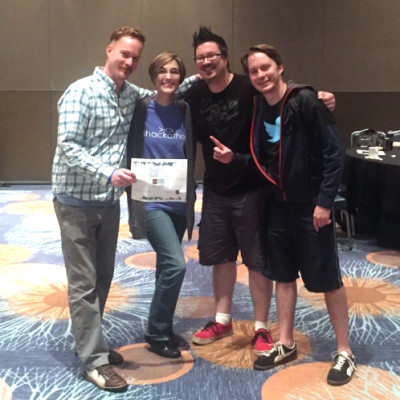
Fishackers, left to right: Greg F. Phillips, Liz M. King, JR Rickerson and Gene Chorba. (Photo courtesy of Liz King)
In its second go-round, Fishackathon encouraged participants to create apps that can help fisherman work safely and also monitor illegal, unreported and unregulated fishing.
After seeing a tweet on the Georgia Aquarium’s Twitter account in Atlanta, Liz King had to sign up.
“The Fishackathon combined two of my passions — fish and coding — to create this amazing opportunity for me,” King wrote in an email.
And the opportunity paid off. Between drinking coffee and eating junk food, King and her fellow teammates — a friend she had known for years and two attendees she had just met — created the KnowFish app, which provides recreational fishers with local laws based on their location. KnowFish also indicates what fish species are in the area and uses visual sightings data to track trends in resource abundance, according to the team’s Challenge Post page.
###
Curious about what happened in Technical.ly’s cities? Click here to learn about Philly’s ideas to hack public transportation and here to see the five government data sets released during D.C.’s NDOCH events.
Join the conversation!
Find news, events, jobs and people who share your interests on Technical.ly's open community Slack
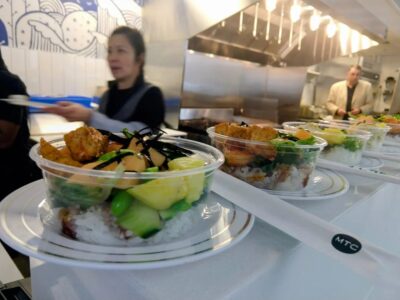
Delaware daily roundup: DE in DC for 'Communities in Action'; diversifying the coffee supply chain; Invista's future

Philly daily roundup: Marketing life sciences; $819M in Q1 VC; Fortune's best places to work
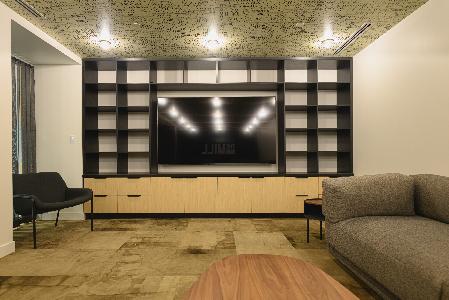
Delaware daily roundup: Where to cowork in 2024; Intertrust Group rebrands; the Visitor Bureau's new website


